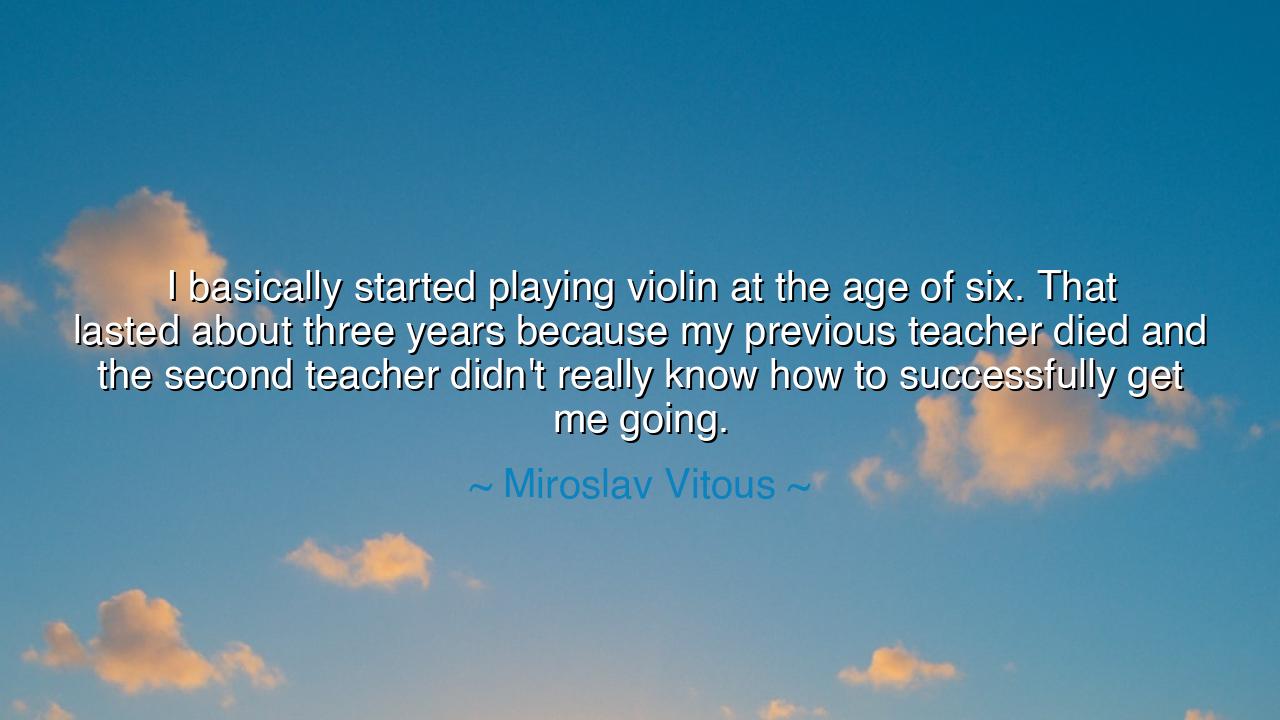
I basically started playing violin at the age of six. That
I basically started playing violin at the age of six. That lasted about three years because my previous teacher died and the second teacher didn't really know how to successfully get me going.






The words of Miroslav Vitous—“I basically started playing violin at the age of six. That lasted about three years because my previous teacher died and the second teacher didn’t really know how to successfully get me going”—carry the bittersweet tones of both destiny and interruption. In this memory, we hear the story of a child whose journey with the violin was first nurtured by a teacher who guided him with care, only to be cut short by death. The next guide, though well-meaning, lacked the vision and skill to awaken the flame, and thus the path faltered. It is a reminder that the journey of mastery is not walked alone: it requires both the fire of the student and the steady hand of the teacher.
The meaning of this reflection is that talent, though it may burn within, often requires the right kind of guidance to be fully kindled. A teacher is not merely a transmitter of knowledge, but a guardian of potential, one who must know how to unlock the hidden gifts of the student. When such a guide is lost, the path can grow dim, for the student may wander without direction. Vitous’s story shows how fragile the thread of destiny can be—shaped not only by passion, but also by the presence or absence of those who can channel it.
This truth has been seen across history. Consider the young Wolfgang Amadeus Mozart, who, though born with genius, flourished under the careful direction of his father Leopold, a devoted musician and teacher. Without such guidance in his formative years, even Mozart’s brilliance might have struggled to find expression. Likewise, Beethoven’s early lessons, though harsh, laid the foundation for his greatness. Guidance at the right moment is like the wind upon a flame: it can either fan it into brilliance or let it die into smoke.
There are also stories of what happens when that guidance fails. The painter Van Gogh sought mentors in art, but often found rejection and misunderstanding. Without steady teachers to nurture his early years, he wrestled alone with despair, and only through relentless personal struggle did he create works that would later astonish the world. Vitous’s words echo this same danger: when the next guide is unable to awaken the spirit, the journey risks delay, or even abandonment.
Yet within this challenge lies another lesson. Vitous did not remain bound by the limits of those early years. Though the violin did not continue, he later found his path through other instruments, most notably the bass, and from there gave the world music of depth and power. This shows that even when one path is hindered, the soul that burns for creation will find another way. A teacher may fail, but the inner calling endures, waiting for new soil in which to grow.
The lesson for us is twofold: first, to recognize the sacred role of teachers, for they are the ones who shape destinies in ways often unseen; and second, to remember that when guidance fails, one must not abandon the journey, but seek another door. The spirit of artistry is not bound to one instrument, one mentor, or one beginning. If the violin falls silent, another voice will arise, if only the seeker remains true to the calling.
Practically, this means that those who teach must take their role with seriousness and humility, knowing that the growth of a soul may depend on their care. And those who learn must be willing to adapt when life interrupts, trusting that their gift can find expression in new forms. If one guide is lost, search for another; if one path closes, carve another. For talent, like a river, will find its way to the sea, even if it must change course again and again.
Thus let this wisdom be remembered: the path of mastery is fragile yet resilient. Teachers may come and go, paths may rise and fall, yet the spirit that seeks to create cannot be silenced. Honor your teachers, but if they fail, do not despair. The calling within you is greater than circumstance, and if you follow it faithfully, it will find its rightful place in the world.






AAdministratorAdministrator
Welcome, honored guests. Please leave a comment, we will respond soon